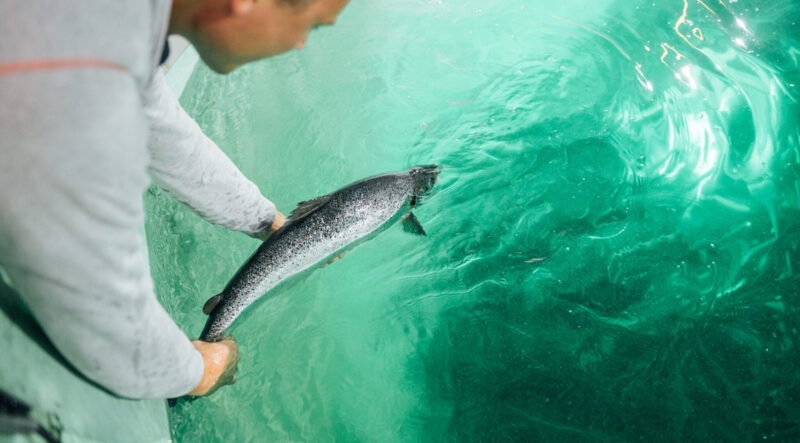Atlantic Sapphire’s aquaculture woes is a cautionary tale
Financial woes and setbacks at Atlantic Sapphire, the largest global onshore aquaculture company in the world, show the technology to replace ocean-based salmon farms to land based operations on a large scale is years away.
By Fabian Dawson
SeaWestNews
Atlantic Sapphire, the leading land-based aquaculture company in the world, has become a cautionary tale for anti-fish farm activists in Canada, who want to replace growing salmon in their natural ocean environment with an industry that grows fish in land-based tanks.
The company which has been the go-to example for the activists, who insist that land-based salmon farming can immediately replace ocean-based salmon aquaculture on Canada’s west coast, recently announced that it had suffered a net loss of USD 51.5 million in the first six months of 2021.
This triggered a share price crash wiping $250 million off Atlantic Sapphire’s market cap as analysts said the company is now worth $1 billion less than it was just 6 months ago.
Last weekend, the company was gasping for air – literally – as it feared running out of oxygen supply needed for its land-based RAS (recirculating aquaculture system) facility.
Available oxygen supplies were being purchased by hospitals, which are being hit by a new wave of coronavirus infections in the United States.
However, the land-based farmer said it had managed to secure some supplies of non-medical grade liquid oxygen through a partnership with Miami Dade County.
Atlantic Sapphire said that this oxygen is not suitable for human use and as such, is not denying essential supplies for hospital patients.
“Deliveries of oxygen in Florida are in extremely high demand from health and public safety customers. Limited supply of oxygen in the USA, coupled with USA federal working hour restrictions on truck drivers, has constrained their ability to deliver oxygen. This is expected to be ongoing for the next few weeks. Ultimately, the consequences and timeline of the Coronavirus are still unclear and the overall effect on the business is uncertain,” Atlantic Sapphire said in an interim report about its 2021 performance.
Last April, the Florida-based Atlantic Sapphire , suffered a mass mortality, proving yet again that the technology needs a lot more work. It was the company’s 4th such incident and prompted a management change, triggered an investor flight and left the company unable to meet its targets.
The company, which has secured permits to produce 90,000 tonnes of salmon in its facility near Miami, is now looking to pivot to raising rainbow trout which could shorten the production cycle at its RAS land-based farm, reduce risk and lower the cost per kilo.
Atlantic Sapphire’s setbacks attest to the fact that the technology to replace ocean-based salmon farms to land based operations on a large scale is years away.
“Nobody is doing it successfully on a large scale…the people behind the mega land-based farms are mostly about raising money, not raising fish,” a veteran fish farmer told SeaWestNews.
Several other studies, from government, industry and scientists have also shown that growing fish on land to market size will impact climate change, at a greater pace.
The studies have also shown land-based farms will leave a damaging ecological footprint due to high power consumption and land use or that growing just 75,000 tons of salmon would require 4.16 billion litres of water just to fill the tanks.
A global report on The Evolution of Land-based Atlantic Salmon Farms shows that farming Atlantic salmon in their natural environment — the ocean — is the responsible way to farm.
Other challenges to land based RAS grow-out facilities include the global shortage of a trained workforce, fish health, broodstock development, stocking densities, and financial risks, according to The State of Salmon Aquaculture Technologies study released in February 2020.
Currently, B.C. ocean-based salmon farms emit only 2.2 kilograms of carbon dioxide for every kilogram of edible fish produced. That is less than half of any animal raised on land, including 5.1 kilograms of CO2 per kilogram of chicken, 6.4 kilograms for pork, and 37.2 kilograms for beef.
Should British Columbia succumb to the demands of anti-fish farm activists to move all ocean-based salmon farms to land based operations, the province will see a whopping increase of 22,881,000 kilograms of Greenhouse Gas (GhG) emissions, according to an independent study by RIAS Inc.
The BC Salmon Farmers Association, said its members lead the world in land-based recirculating aquaculture systems.
All BC ocean-based farmers raise fish for their first half of their lives in land-based hatcheries and several fish farmers operate smaller land-based grow-out operations, the association states in its latest innovation and technology report.
“Land-based salmon farming currently has significant challenges which need to be addressed before it becomes a viable option for full scale commercial production.
With demand for healthy fish rising with the world’s population and new technology being developed, land-based fish farming will play a larger role in future food production, along with ocean-based farming,” the report said.
Farmed Atlantic salmon is BC’s top seafood export with a total economic output of $1.6 billion. The industry currently supports nearly 6,500 full time jobs that pay 30% higher than BC’s median income.
(Image courtesy of Atlantic Sapphire Facebook)

